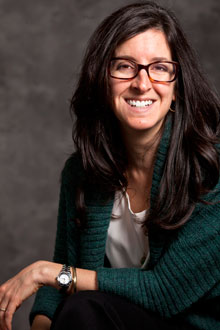
U.S. history shows that Americans have vaccinated not only for medical reasons, but also based on other factors including political and cultural fears, according to Elena Conis, assistant professor of history at Emory and an expert in the history of U.S. disease prevention.
In her new book "Vaccine Nation: America's Changing Relationship with Vaccination," Conis traces the U.S. history of common vaccinations (such as mumps, measles, polio, Hepatitis B and HPV) and examines how vaccines and their public acceptance have evolved since the 1960s through today, as an increasingly vocal group of Americans refuses vaccinations for themselves and their children.
The development, availability and public acceptance of vaccines are driven by a complex web of culture, politics and philosophy, Conis says. Polio, for example, was one of the most feared diseases of the 1940s and 1950s. Americans donated money to find a cure and when a vaccine became available, people lined up by the thousands for their children to receive the vaccine. Yet, during that period, polio was far from the top health threat to children, Conis observes.
Many more people were dying of pneumonia, flu or tuberculosis. But the country didn't get behind vaccinations for those diseases at the time, she adds. They didn't inspire the same collective fear and confidence that they were illnesses that could — or must — be cured.
Another example Conis points to is mumps, which had been accepted as a common and typically non-fatal childhood ailment for many years. It wasn't until U.S. soldiers living in close quarters during World War II were struck by the virus that demand surfaced for a vaccine to prevent it, she says.
Just as societies don't develop and administer vaccines for only medical reasons, people don't resist vaccinations for only medical reasons, according to Conis.
Americans who reject vaccinations for themselves or their children are currently a topic of debate, Conis says. Some parents have taken the stance that the risk of vaccine-preventable diseases has been overblown, and that vaccine recommendations cannot always be trusted because of conflicts of interest among policy makers and the companies that develop and market vaccines.
"There are political, cultural and economic reasons related to vaccines on both sides of the current debate, so we should acknowledge those reasons and make them part of the conversation," Conis says.
"In order to understand these choices, we have to look at this through a different lens. It's not just about statistics for those who refuse vaccination," she says. "For some, it's about choice and personal medical freedom."
For much of the past century, by contrast, Americans implicitly trusted their doctors, government and the healthcare industry to protect their health, Conis says.
"We had tremendous faith in our scientists and experts for much of the 20th century. But that faith started to erode in the late 20th century," she says.
There's a pattern in medical history of experts telling the public that something is beneficial (opium-based tonics, red meat, cigarettes) only to later recant the advice based on new scientific evidence, Conis says.
And while vaccines are nearly universally recommended by medical experts of all kinds, previously debunked medical practices have helped breed skepticism of the medical establishment in certain circles.
"Vaccines seem to be a victim of that historical pattern," Conis says.
